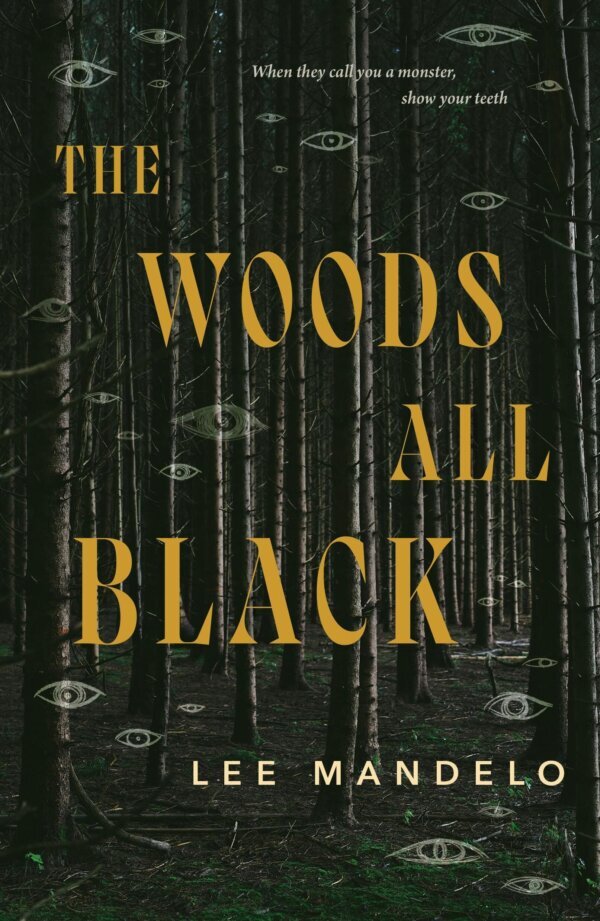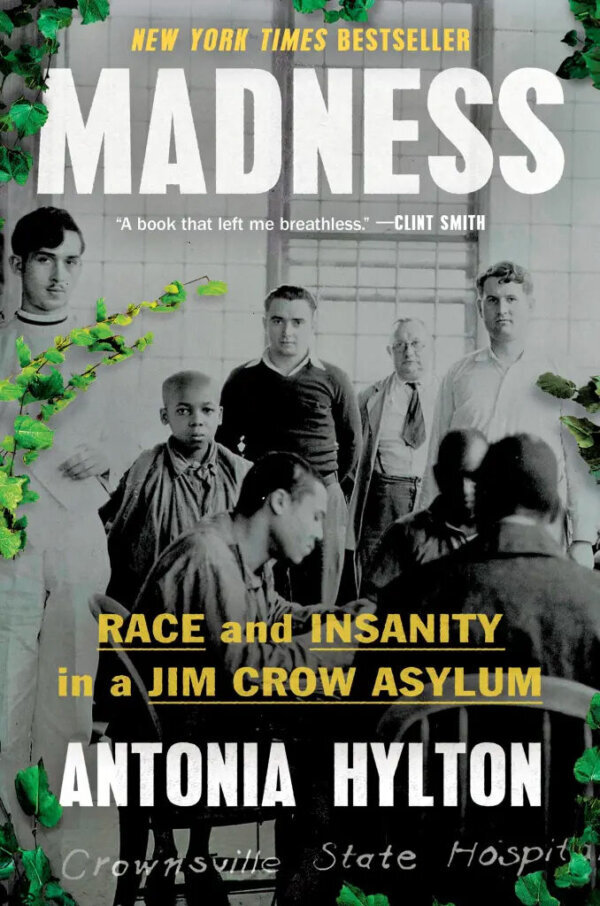This story was written as part of the WTOP Book Report series authored by Terik King. Read more of that coverage here.
Whether you crave riveting fiction, thought-provoking nonfiction, or something in between, the WTOP Book Report’s top books of 2024 are a testament to the power of the written word. Here are a few favorites that emerged as the cream of the crop across various genres this past year.
WTOP’s 2024 in Review:
MYSTERY/SUSPENSE FICTION: “My Name Was Eden” by Eleanor Barker-White
Eleanor Barker-White’s debut novel, “My Name Was Eden,” is a haunting psychological mystery that explores family dynamics, identity and unresolved trauma. The story centers on Lucy, her husband James and their teenage daughter Eden. After a near-fatal drowning incident, Eden inexplicably returns not as herself but as “Eli” — the name reserved for the unborn twin who vanished in utero. This bizarre transformation fractures the family and unearths hidden fissures in their relationships.
Lucy, who struggled to bond with Eden, becomes unnervingly receptive to this “new” child, seeing Eli as a second chance to be the good mother she never was. James, however, clings to the belief that Eden remains his daughter, resisting any suggestion of the supernatural. As Eden’s behavior grows increasingly unfamiliar — steady, calm and unsettlingly perfect — the novel raises questions about identity, motherhood and the nature of the self.
In her interview with The Book Report, Barker-White revealed the story was inspired by her own experience with vanishing twin syndrome. She describes her fascination with the phenomenon — where one twin “vanishes” during pregnancy — and how it sparked her exploration of loss, longing and the “what ifs” surrounding a missing child.
“I started wondering where the twin had gone and what it would have been like,” she reflected.
Barker-White skillfully layers themes of generational trauma and family perceptions throughout the story. As Lucy’s unresolved traumas collide with Eden/Eli’s return, the novel masterfully leaves readers unsettled, grappling until the end with whether the events are supernatural or psychological.

MEMOIR: “That Librarian” by Amanda Jones
In “That Librarian,” Amanda Jones, a Louisiana school librarian, tells the compelling and courageous story of her fight against censorship and book bans in the United States. Part memoir, part manifesto, the book delves into Jones’ personal experiences as she battled for inclusivity and representation in libraries while exposing the coordinated efforts behind book banning campaigns.
Jones’ journey began in July 2022 when she delivered a speech at a public library board meeting, opposing the removal of books that discussed LGBTQ+ themes, racial issues and other diverse perspectives.
“I was raised to speak out against injustice,” she said in her interview with WTOP.
WTOP’s 2024 in Review:
Her speech, however, made her a target for harassment. Extremist groups circulated posts falsely accusing her of distributing pornography to children, leading to threats of violence, calls for her dismissal and widespread defamation.
The fallout from that speech was devastating.
“The first week, I couldn’t get out of bed,” Jones said.
Despite the emotional toll, she found strength through the support of fellow librarians and authors across the country. A defamation lawsuit, which Jones filed to reclaim her name, became her way of standing up against a campaign of lies and hate.
“If we teach students to stand up to bullies, I had to do the same,” she said.
Through her legal battle and activism, Jones uncovered a deeply rooted network of organizations driving book bans. These groups, she argues, operate with “dark money,” political agendas and the goal of maintaining control by erasing minority voices.
“These book challenges target our most vulnerable communities — LGBTQ+ individuals and BIPOC authors,” Jones wrote. “It’s about fear, power, and control.”
Jones’ love for books and their ability to foster empathy is at the heart of her advocacy. Inspired by Rudine Sims Bishop’s quote about books being “windows, mirrors, and sliding glass doors,” Jones believes that stories save lives and build understanding.
“I want every child to see themselves in a book and to grow into empathetic and kind people,” she said.
Jones’ memoir is both a rallying cry and a warning. She calls on readers to scrutinize social media narratives, attend local board meetings and support libraries as sanctuaries of free thought and inclusion. With a blend of personal anecdotes and hard-hitting research, “That Librarian” paints a sobering picture of the culture wars targeting public libraries while igniting hope for resistance through collective action.

LGBTQ HORROR/FICTION: “The Woods All Black” by Lee Mandelo
Lee Mandelo’s “The Woods All Black” is a haunting historical fantasy novella set in 1929 in Spar Creek, Kentucky, an isolated Appalachian town rife with religious extremism and social oppression. The story follows Leslie Bruin, a nurse who identifies as an “invert” (using he/him pronouns) assigned by the Frontier Nursing Service to deliver medical care in the backwoods. Forged by his experiences on the Western Front and shaped by the queer salons of 1920s Paris, Leslie is no stranger to judgment. Yet, he finds himself unprepared for the festering darkness in Spar Creek, where a cruel congregation is determined to “correct” Stevie, a rebellious young trans man who refuses to conform.
As Leslie becomes embroiled in Spar Creek’s violent conflicts, he grapples with his identity, his attraction to Stevie and the looming threat of religious tyranny. Stevie, meanwhile, emerges as a force of supernatural resistance, refusing to be tamed. Together, the two navigate themes of survival, autonomy and revenge in the face of oppression. As Mandelo puts it, the story carries “wish fulfillment” for queer readers, offering a cathartic exploration of identity and defiance.
Mandelo emphasizes the importance of rooting the novel in historical reality. The narrative draws heavily on Mandelo’s primary research into the Frontier Nursing Service and the complex queer identities of the time. As Mandelo told WTOP, “Leslie very explicitly in the book calls himself an ‘invert,’ which is a category we just don’t use anymore … Stevie, on the other hand, just considers himself a gay man doing his thing.” The story contrasts Leslie’s experiences in queer spaces with Stevie’s self-taught resistance to the social violence around him.
Despite its historical setting, “The Woods All Black” reflects contemporary struggles. Mandelo highlights parallels between the 1920s rise of fascism and current political climates.
“It is both a historical novel and very much a way of looking at contemporary politics … where you don’t have to ‘take it lying down.’”
This book doesn’t shy away from difficult subjects, including eugenics, reproductive justice and religious tyranny. Yet, it also incorporates moments of joy and passion. As Mandelo states, “I want it to be enjoyable to both have critical thoughts about reproductive justice and resistance … but also (for readers) to enjoy reading a sex scene between queer people.”
Mandelo’s ultimate goal is to push past sanitized portrayals of queerness, offering stories that affirm the fullness of queer lives, from love and desire to survival and triumph.
“The Woods All Black” is an unapologetic celebration of queer resistance and identity, delivering both blood-soaked revenge and moments of tender humanity.
“Those were the books that I needed as a young queer person growing up,” Mandelo said.

HISTORICAL NONFICTION: “Madness” by Antonia Hylton
Along the quiet, desolate stretch of Crownsville Road in Anne Arundel County, Maryland, stands the abandoned 544-acre campus of the former Crownsville State Hospital, formerly known as the “Hospital for the Negro Insane.”
Antonia Hylton’s “Madness” is a profound exploration of the 93-year history of Crownsville Hospital, a Jim Crow-era asylum built in 1911. Through exhaustive research and oral history, Hylton examines the legacy of slavery and systemic racism in America’s mental health care system. “Madness” is “history, oral history, science history … Black history … and American history,” interwoven with Hylton’s personal family story.
The book opens with the chilling “origin story” of Crownsville, where 12 unnamed Black men were forced to clear land, lay bricks and build the very asylum that would incarcerate them as its first patients. Hylton explained, “Officials marched these 12 men into the forest. … They weren’t welcomed into a ward or a hospital. They had to start doing the backbreaking work of clearing a forest, constructing roads … building an asylum.”
This “almost biblical” tale reflects America’s postslavery ethos, where the asylum’s plantation-style operations forced Black patients to sustain the institution through unpaid labor, producing rugs, tobacco and other goods.
Crownsville’s exploitative practices mirrored the dehumanization of the plantation system, but its history also provides insight into broader systemic failures. Hylton noted while mental health care has failed Americans across all racial groups, “it has been the worst and the hardest, the most traumatic for the most marginalized among us, and that has historically been Black and brown communities.”
Unlike white-only asylums, which incorporated labor programs to rehabilitate patients, Crownsville disproportionately relied on the forced labor of its Black patients to fund the institution, leaving it underfunded and overcrowded.
Hylton also delves into the institutional transformations during the Civil Rights era, when Black professionals began working at Crownsville. The first Black doctor arrived in the 1940s, confronting hostility from white staff who resisted integration. Over time, many white employees fled, leaving the hospital nearly all-Black by the 1980s. Despite their efforts, systemic underfunding continued to plague the hospital. Hylton described this as a familiar dynamic for Black Americans: “To be Black in this country, you’re kind of expected to do two times as much with half the support.”
The book highlights Crownsville as a microcosm of America’s racial and social history, chronicling the persistence of inequities from slavery to modern mental health care. Hylton’s investigation, fueled by 10 years of interviews and research, humanizes the generations of patients, employees and community members who shaped and survived the hospital’s legacy.
As Hylton told WTOP, “When you have leaders who don’t see their patients as human, you can’t trust the records they leave behind. You have to go to the real source.”
Through their voices, “Madness” restores a long-overlooked chapter of Black history and provides a vital lens for understanding America’s present struggles with mental health care and racial injustice.

HUMOR/FICTION: “Margo’s Got Money Troubles” by Rufi Thorpe
Critically acclaimed author Rufi Thorpe, a PEN/Faulkner finalist for “The Knockout Queen,” has returned with her latest novel, “Margo’s Got Money Troubles.” The story delves into themes of motherhood, financial instability and personal reinvention, all wrapped in Thorpe’s signature humor and emotional depth.
The book follows Margo, a college freshman who, after an affair with her English professor, becomes a single mother struggling to make ends meet. Fired from her job and overwhelmed by motherhood, Margo turns to OnlyFans to support herself. Enter her estranged father, Jinx, a former pro wrestler, who moves in and helps Margot craft a compelling online persona, “Hungry Ghost.” While Jinx’s unconventional advice helps Margot’s account take off, it also leads to unexpected challenges.
“I’ve always been fascinated by the Madonna-whore complex and wanted to create a character who defied that dichotomy. Margo is both a good mother and a good sex worker, which challenges cultural stigmas,” Thorpe said.
Jinx’s character, Thorpe revealed, stemmed from her fascination with professional wrestling.
“There are striking similarities between wrestling and sex work,” she said. “Both involve selling a fantasy and carry cultural stigma.”
Despite its weighty themes, the novel balances humor and heart.
“Humor gives you leeway to explore darkness. It’s about saying the truth no one else will.”
Asked how she’d pitch the book to hesitant readers, Thorpe said, “It’s silly, funny and ultimately kind.”
Get breaking news and daily headlines delivered to your email inbox by signing up here.
© 2024 WTOP. All Rights Reserved. This website is not intended for users located within the European Economic Area.
This post was originally published on here







